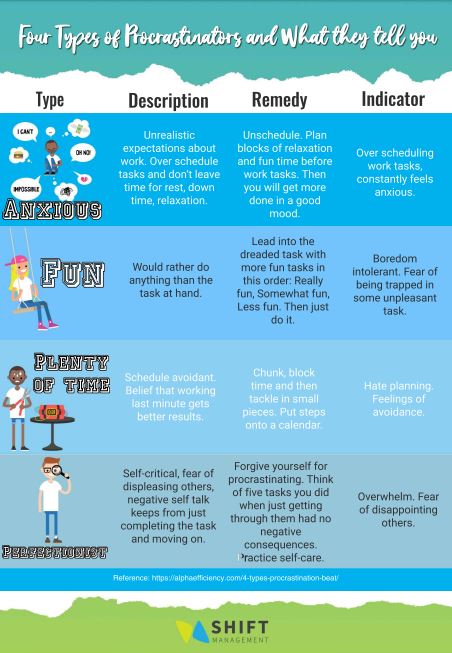We procrastinate because of emotional regulation issues, not time management. ~ Dr. Tim Pychyl
According to Dr. Tim Pychyl of the Procrastination Research Group (as quoted in the New York Times), we procrastinate because of emotional regulation issues, not time management. Feeling disempowered or inadequate or worrying that we will lose face or displease others stops us from taking on the task that could have all these negative results. Procrastination in this context is based on fear – False Expectations Appearing Real. On the other hand, creativity studies show that procrastination can be an important part of the creative process. People who creatively procrastinate are often inventors, artists and writers. Share on X They allow time for their minds to wander, to do other things and to talk through or read around, research and just think about things before doing anything about the desired outcome. So how do you know the difference? It has to do with whether you are doing active or passive procrastination. Allow me to explain.
Active procrastinators understand that they must give themselves some process time, and down time to get things done. They allow things to unfold within a process and observe the occurrence of steps and milestones as they accomplish a task. Passive procrastinators on the other hand experience anxiety over their procrastination, have little understanding of why they put things off, feel shame and self-doubt about their procrastinating and need strategies to regulate emotionally to get work done and move past procrastinating negative thinking.
Kendra Cherry wrote in The psychology of procrastination, that there are 15 reasons why people procrastinate, so knowing your reason and your emotions around procrastination can help you find the right solution – or just allow yourself the time you need to process a task for things that require active procrastination. To help identify your own patterns of procrastination, I created a chart based on the behaviour, the remedy and typical fears or issues underlying each reason.
|
Procrastination behaviour |
Remedy |
Fear/Belief/Underlying issue |
| Not knowing what needs to be done | Find out what needs to be done, and get the details. Then chunk, block and tackle to break it down into smaller tasks. | Fear of looking stupid or of losing face by asking for guidance and clarification |
| Not knowing how to do something | Ask, research it, google the steps. Take initiative and figure it out. | Fear of making a mistake I the process and fear of being blamed for not doing something right. Learned passivity. |
| Not wanting to do something | Find something in the task that motivates you or find inspiration in the result. | Fear of being unsafe. Fear of being bored. Fear of the unknown. Fear of displeasing others. Fear of loss of control. |
| Not caring if it gets done or not | Apathy means you are either in the wrong job, have a toxic workplace, a critical supervisor or that you have too many times experienced that no matter what you do the results are the same for you. Ask yourself if you should really be there and if so, look for something or someone who inspires you to focus on the result. | Resistance from a history of being criticized, not knowing why or what the purpose of the task is, not seeing your role in the process, feeling unacknowledged and unappreciated. |
| Not caring when something gets done | Create space in your schedule, block off time for yourself to get something done that you want to do first. Find out who is affected if you are late and what that means to the other person. | Overwhelm with other duties or lack of commitment due to no consequences if you are late. |
| Not feeling in the mood to do it | Take a break, get a nap, go for a walk. Try again later. | Tired, low energy, frustrated or feeling criticized. |
| Being in the habit of waiting until the last minute | Set your own set of deadlines leading up to the one that has been imposed. Take action on one step. | Defense mechanism related to having to follow other people’s deadlines. |
| Believing that you work better under pressure | Forgive yourself for procrastinating. Then schedule a time to work on one part of the task with a rule you must do if you miss the deadline for that part of the task (ie must finish before going home Friday) | Avoidance of unpleasant tasks and habitual self distraction behaviours. |
| Thinking that you can finish it at the last minute | Get an accountability buddy who holds you to your promise and to a simple 1-2 step plan. | Avoidance of planning and distaste of planning. Belief that you are better in the moment than if you are prepared. |
| Lacking the initiative to get started | Plan to do something enjoyable or fun first, with a clear start time on the task | Not enough fun or downtime in your life. Belief that you should always be working. |
| Forgetting | Set up a phone calendar with reminders. Write sticky notes to yourself. | No schedule or calendar |
| Blaming sickness or poor health | Emotional blocks to success, to health and to being accountable | Fear of success. |
| Waiting for the right moment | No scheduled time for creative work. Start the week, weekend or day with one creative task you really want to do. Stick to the time even if you do nothing with it at first. | Fear of incompetence or fear of success. Stuck in inaction. “Even if a part of me feels stuck right now…I know I can get started with a first step.” |
| Needing time to think about the task | Need process time. Write through the tasks, choose a time when you can think it through. Schedule another time to start a part of the task | Lack of self-awareness. Understand your own inner processes and needs for getting work done. Work with yourself instead of against yourself. |
| Delaying one task in favour of working on another | Allow yourself time to do one or two more enjoyable tasks but put on a timer. Then start the other task. | Not enough fun! Allow yourself some fun time, just put a time limit on it. |
Another useful way to think about procrastination is to identify which of the four types of procrastinators you happen to fall into most frequently. Then adjust accordingly. Neil Fiore (quoted in Alpha Efficiency), identifies the four procrastinator types as follows:
- Anxious
- Fun
- Plenty of time
- Perfectionist
Here are his types, descriptions and remedies. I added an indicator to help you determine which feels most like you.
So now you know these things about why people procrastinate:
- They are either active procrastinators using time to process a problem or they are passive procrastinators who have to regulate their emotions rather than manage their time.
- Using the 15 reasons people procrastinate table can help you determine what remedy you need to deal with based on the fear or underlying issue.
- The four types of procrastinators provide another model for understanding your own patterns of procrastination so you can be more self-aware and apply the remedy accordingly.
Happy reflecting!
Marie Gervais, PhD., CEO of Shift Management Inc., provides managerial training and workforce interpersonal development to business and industry through online courses and web coaching. She helps individuals and organizations build talent and skills for leadership, communication, and conflict resolution particularly at the supervisory and middle management level. Her work has gained a reputation for excellence in integration and inclusion of the diverse workforce. With her team at Shift Management, Dr Gervais helps clients reach their business goals through team building coaching and industry-specific training development for interpersonal leadership skills. Her impactful digital and multi-media resources have been successfully implemented with many different populations and contexts. The results prove that a learning workplace is a happy and profitable one!
Check out Marie’s podcast Culture and Leadership Connections on Apple Podcasts and on the Shift website to hear stories of leadership and all things cultural. Consider the signature Supervisory Leadership Certificate Course for upskilling your workforce at:
https://shiftworkplace.com/courses/supervisory-leadership/
Contact information:
780 993 1062









